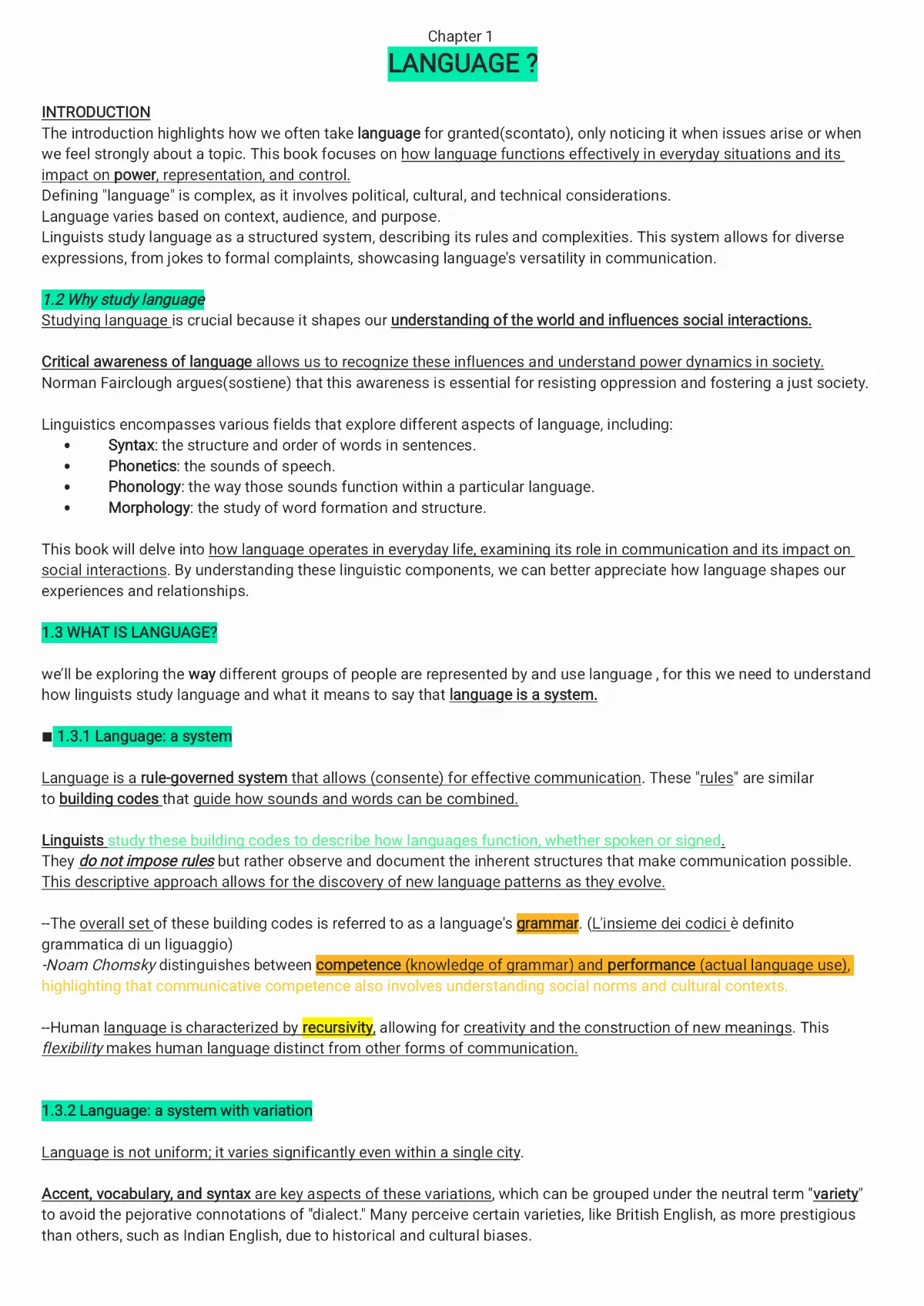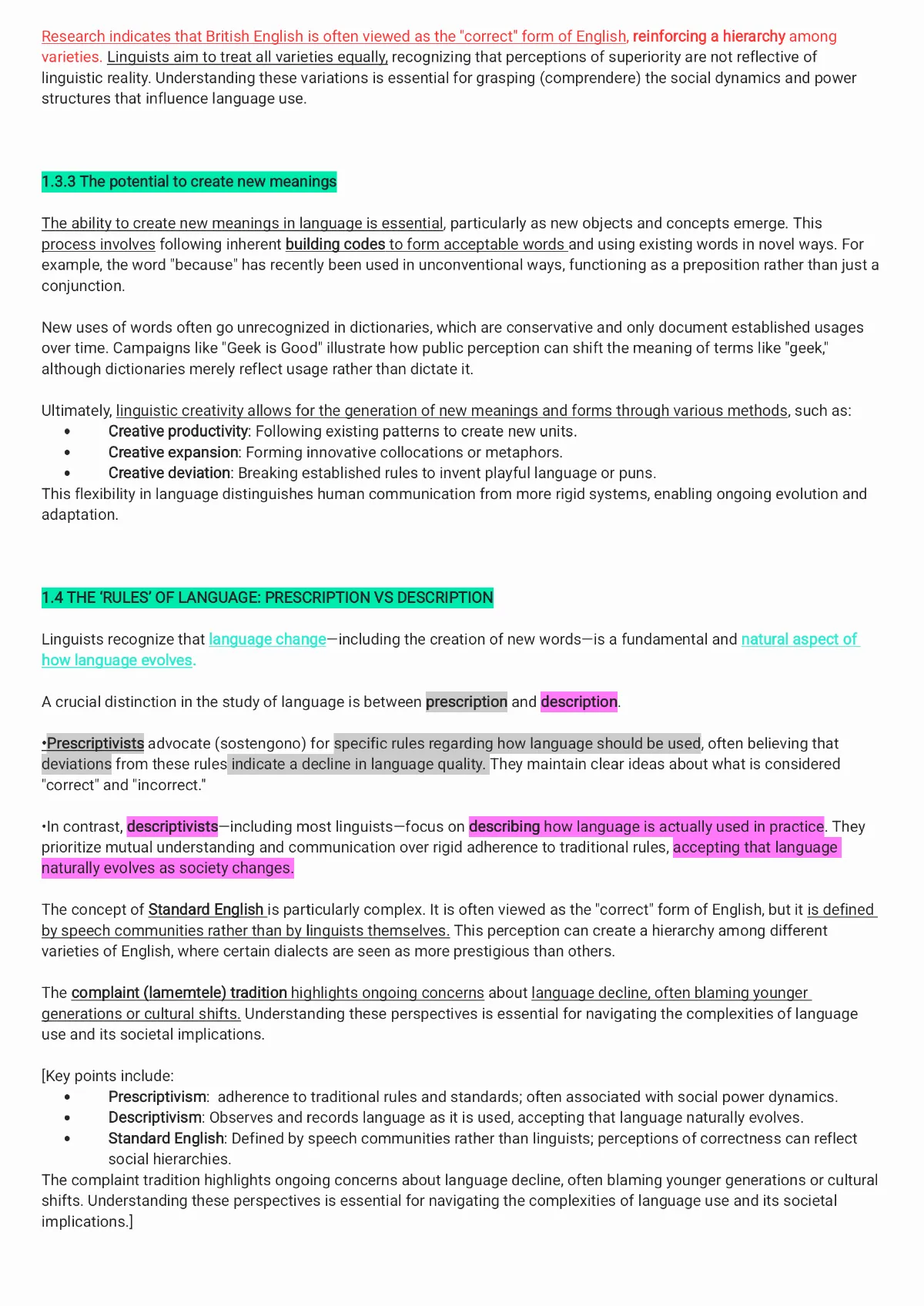Language as a System: Variations, Global Englishes, and Societal Role
Document from University about Language as a System, Variations, and Societal Role. The Pdf explores the concept of language, its functions, variations, and social impact, with a focus on global English and its didactic implications for university students studying Languages.
Ver más32 páginas


Visualiza gratis el PDF completo
Regístrate para acceder al documento completo y transformarlo con la IA.
Vista previa
Chapter 1 Language Introduction
The introduction highlights how we often take language for granted(scontato), only noticing it when issues arise or when we feel strongly about a topic. This book focuses on how language functions effectively in everyday situations and its impact on power, representation, and control.
Defining "language" is complex, as it involves political, cultural, and technical considerations. Language varies based on context, audience, and purpose. Linguists study language as a structured system, describing its rules and complexities. This system allows for diverse expressions, from jokes to formal complaints, showcasing language's versatility in communication.
Why Study Language
Studying language is crucial because it shapes our understanding of the world and influences social interactions. Critical awareness of language allows us to recognize these influences and understand power dynamics in society. Norman Fairclough argues(sostiene) that this awareness is essential for resisting oppression and fostering a just society.
Linguistics encompasses various fields that explore different aspects of language, including:
- Syntax: the structure and order of words in sentences.
- Phonetics: the sounds of speech.
- Phonology: the way those sounds function within a particular language.
- Morphology: the study of word formation and structure.
This book will delve into how language operates in everyday life, examining its role in communication and its impact on social interactions. By understanding these linguistic components, we can better appreciate how language shapes our experiences and relationships.
What is Language
we'll be exploring the way different groups of people are represented by and use language, for this we need to understand how linguists study language and what it means to say that language is a system.
Language as a System
Language is a rule-governed system that allows (consente) for effective communication. These "rules" are similar to building codes that guide how sounds and words can be combined. Linguists study these building codes to describe how languages function, whether spoken or signed. They do not impose rules but rather observe and document the inherent structures that make communication possible. This descriptive approach allows for the discovery of new language patterns as they evolve.
- The overall set of these building codes is referred to as a language's grammar. (L'insieme dei codici è definito grammatica di un liguaggio)
- Noam Chomsky distinguishes between competence (knowledge of grammar) and performance (actual language use), highlighting that communicative competence also involves understanding social norms and cultural contexts.
- Human language is characterized by recursivity, allowing for creativity and the construction of new meanings. This flexibility makes human language distinct from other forms of communication.
Language System with Variation
Language is not uniform; it varies significantly even within a single city. Accent, vocabulary, and syntax are key aspects of these variations, which can be grouped under the neutral term "variety" to avoid the pejorative connotations of "dialect." Many perceive certain varieties, like British English, as more prestigious than others, such as Indian English, due to historical and cultural biases.Research indicates that British English is often viewed as the "correct" form of English, reinforcing a hierarchy among varieties. Linguists aim to treat all varieties equally, recognizing that perceptions of superiority are not reflective of linguistic reality. Understanding these variations is essential for grasping (comprendere) the social dynamics and power structures that influence language use.
Potential to Create New Meanings
The ability to create new meanings in language is essential, particularly as new objects and concepts emerge. This process involves following inherent building codes to form acceptable words and using existing words in novel ways. For example, the word "because" has recently been used in unconventional ways, functioning as a preposition rather than just a conjunction.
New uses of words often go unrecognized in dictionaries, which are conservative and only document established usages over time. Campaigns like "Geek is Good" illustrate how public perception can shift the meaning of terms like "geek," although dictionaries merely reflect usage rather than dictate it.
Ultimately, linguistic creativity allows for the generation of new meanings and forms through various methods, such as:
- Creative productivity: Following existing patterns to create new units.
- Creative expansion: Forming innovative collocations or metaphors.
- Creative deviation: Breaking established rules to invent playful language or puns.
This flexibility in language distinguishes human communication from more rigid systems, enabling ongoing evolution and adaptation.
Rules of Language: Prescription vs Description
Linguists recognize that language change-including the creation of new words-is a fundamental and natural aspect of how language evolves. A crucial distinction in the study of language is between prescription and description.
- Prescriptivists advocate (sostengono) for specific rules regarding how language should be used, often believing that deviations from these rules indicate a decline in language quality. They maintain clear ideas about what is considered "correct" and "incorrect."
- In contrast, descriptivists-including most linguists-focus on describing how language is actually used in practice. They prioritize mutual understanding and communication over rigid adherence to traditional rules, accepting that language naturally evolves as society changes.
The concept of Standard English is particularly complex. It is often viewed as the "correct" form of English, but it is defined by speech communities rather than by linguists themselves. This perception can create a hierarchy among different varieties of English, where certain dialects are seen as more prestigious than others.
The complaint (lamemtele) tradition highlights ongoing concerns about language decline, often blaming younger generations or cultural shifts. Understanding these perspectives is essential for navigating the complexities of language use and its societal implications.
[Key points include:
- Prescriptivism: adherence to traditional rules and standards; often associated with social power dynamics.
- Descriptivism: Observes and records language as it is used, accepting that language naturally evolves.
- Standard English: Defined by speech communities rather than linguists; perceptions of correctness can reflect social hierarchies.
The complaint tradition highlights ongoing concerns about language decline, often blaming younger generations or cultural shifts. Understanding these perspectives is essential for navigating the complexities of language use and its societal implications.]
Language: Multiple Functions
ADDRESSER MESSAGE CONTACT CODE CONTEXT ADDRESSEE
Language has the ability to serve multiple functions simultaneously, and ROMAN JAKOBSON, a prominent linguist, emphasizes the importance of investigating these varied functions. He presents a framework for understanding communication that includes several key components:
- the Addresser (the speaker)
- the Addressee (the listener)
- the Message (the content being conveyed), Contact (the medium of communication, such as spoken or written language), Code (the shared symbols or language understood by both parties), and Context (the social and linguistic environment in which the communication occurs).
EMOTIVE REFERENTIAL CONATIVE POETIC PHATIC METALINGUAL
Jakobson identifies six primary functions of language.
- The Emotive Function reflects the speaker's feelings or attitudes towards the argument.
- The Referential Function conveys(trasmette) information about the world, allowing speakers to share knowledge and ask for specific things, like passing the salt.
- The Conative Function is aimed at influencing the addressee's response, which can include commands, requests, or attempts at persuasion.
- The Phatic Function is concerned with maintaining social interaction; for example, making small talk about the weather serves to establish rapport rather than convey significant information.
- The Poetic Function, which Jakobson considers particularly important in literature, focuses on the form and aesthetic quality of the message itself. This function is often highlighted in advertising and political speeches, where the way something is said can be as important as what is being said.
Lastly, the Metalingual Function allows speakers to discuss or clarify language itself, ensuring effective communication by asking for explanations or rephrasing. Understanding these multiple functions of language is crucial because they shape how we interact with others and how we exert power through communication. Language is flexible and adaptable, allowing us to navigate different situations effectively. When faced with new uses of language or unfamiliar contexts, we become more aware of our choices and the significance of our words. However, in everyday interactions, many of these functions go unnoticed as we communicate seamlessly.
Power
Defining power in relation to language is complex, as language serves many functions. Speaking a prestigious variety of English, like British English, can enhance a speaker's perceived competence and open doors to better job opportunities and institutions of power. This illustrates how language competence can confer power without direct control. Some countries have institutions that regulate language, such as the Académie Française in France, while authoritarian leaders, like Turkmenistan's former president Saparmurat Niyazov, can impose direct changes to language through decrees. Additionally, symbolic power-the influence exerted through language itself-plays a significant role. Language shapes our perceptions and beliefs over time, contributing to what is seen as "common sense."Ideology structures communication of values and beliefs, influencing behavior without explicit commands. In summary, power in language manifests through both direct and indirect means, affecting how we think and act within social structures. Understanding these dynamics is crucial for recognizing the interplay between language and power relations.